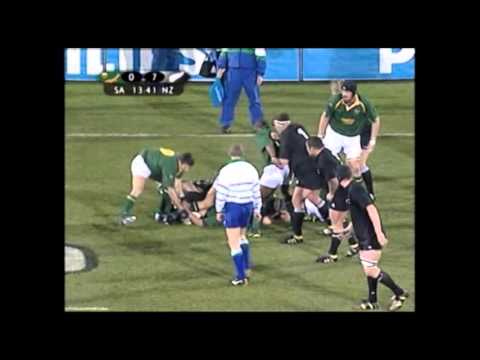Richard Bands may have played only 11 Tests for the Springboks but in that time he managed to ensure himself lifetime recognition for the simple act of scoring a try.
But what a try. The tighthead prop raced half the length of Dunedin's Carisbrook to score one of the more embarrassing tries conceded by the All Blacks over the years.
The occasion was in 2003, ahead of the Rugby World Cup and it set up Bands for lifelong recognition, far more than might normally be expected in an 11-Test career. And helped South Africa to a 19-11 win.
The brevity of his career was down to his late-bloomer status. Distance from his club training base in rural South Africa reduced his ability to attend practice and those who couldn't attend didn't play.
So in his early-20s he gave the game away and only took it up again when ongoing drought forced him to look again at rugby.
"In 1998 I had my third drought and the bank wouldn't help me with a loan. The only thing I knew was to play rugby. I went to Free State, played a year there, and they didn't want to give me a contract, because they said I was a sub-standard player," he told sport24.co.za.
That resulted in a move to the Bulls in Northern Transvaal. He won a place in the Currie Cup side, sharing a win in 2002 and gaining a place in the Springboks.
Future Springbok coach, Heyneke Meyer, had a key role in his development. Firstly, he convinced Bands to stay in Pretoria and secondly, he changed him from a hooker to the tighthead propping role.
"Heyneke came and said, 'If you play hooker, you will be ok, but if you change to tighthead, you will become a Bok'. The change from hooker to tighthead was pretty easy to me, but you need to have some cojones to play there," he said.
But Bands always had basic speed and two of his Bulls appearances were for playing on the wing as a substitute.
On Carisbrook, he had a special chance to put the speed to effective use.
"It was one of those things, I think I scored three or four tries in my life, and if you are going to do it, you need to do it well. They say life is about timing and the timing was awesome," he said.
"They [the All Blacks] kicked the ball and Ashwin [Willemse] took it up. That's what made Joost [van der Westhuizen] such a legend – to see the opportunities, and he passed the ball and I went through the gap, just past the referee [Australian Peter Marshall] – and he didn't blow the whistle.
"Referees are funny guys. They never take the blame for anything. You need to know that you will take that opportunity. He will never blow the whistle to say he was in the way. So I figured out the gap is where the referee stands.
"Carlos [Spencer] was in the way and I bumped him. I was flabbergasted because New Zealand's defence was strong at that stage. Looking over my shoulder I couldn't see any support so I continued and went over for that try."
Spencer's role was also serendipitous. A year earlier, playing for the Blues against the Bulls, Spencer ran straight at Bands in a move.
"I thought I was going to smoke him," Bands said.
"But he looked me in the eye, and just at the right moment sent an to offload to Doug Howlett to go and score under the posts. As he turned around he said, 'Mate, we passed you on the left'."
The pair have since become good friends and Bands related at a recent function Spencer had admitted mucking up the situation at Carisbrook and Bands commented that at least it left them at one-all after the earlier Blues-Bulls incident.
Bands added to his notoriety when bumping future All Blacks captain Richie McCaw in a 2005 Super Rugby game for the Bulls against the Crusaders in Pretoria.
"The Bulls were on fire and it was a hot day in Pretoria, 34 degrees at Loftus with no wind, and the Crusaders came from snow and winter to Pretoria.
"We were on fire, we won the game that day. [Halfback] Fourie [du Preez] played me and McCaw was in front of me, and I just smashed him. As I smashed him you could see his arms going straight and he was out.
"He was lying there for quite a while, and I didn't know but they were struggling to get his tongue out of his throat – he had swallowed his tongue.
"It was a bad incident and I apologised to him afterwards. It was a freak accident," he said.
It also resulted in the Loftus medical staff putting a sign on their golf cart which takes incapacitated players from the field. It said 'Kiwi recovery vehicle' and the sign remains today. As does the pain associated with the ease with which he scored his try.



Hi Lynn...hope my message finds you...thank you for a great article..
Richard Bands